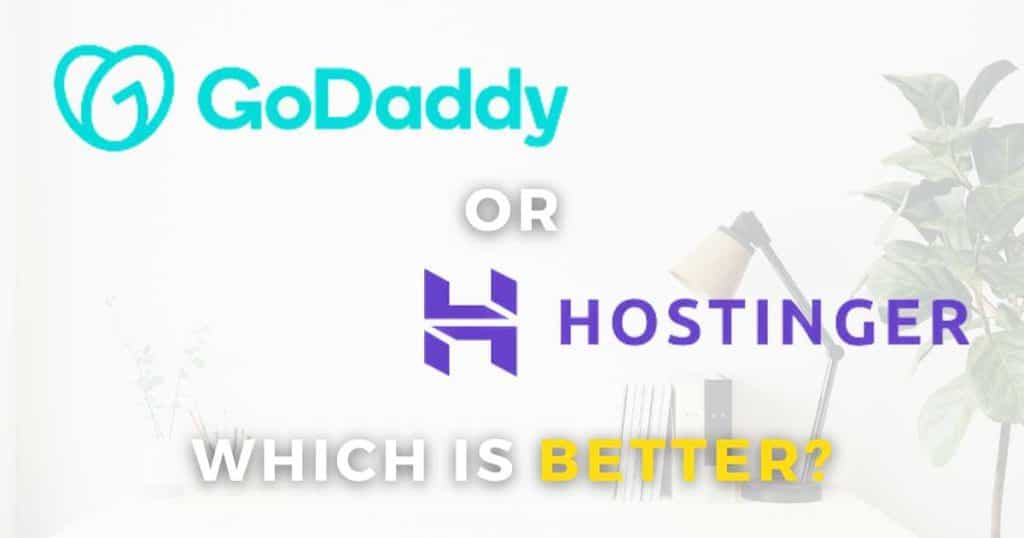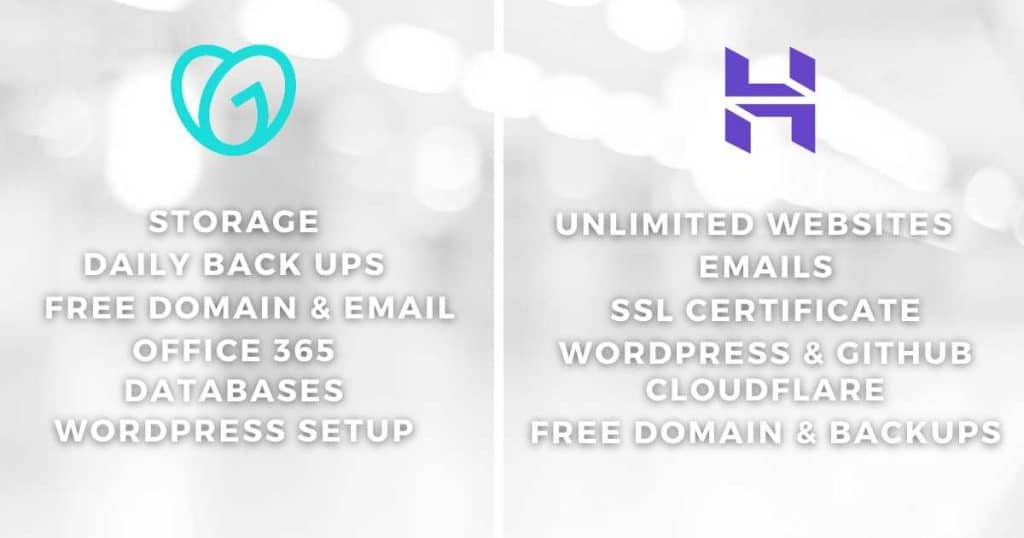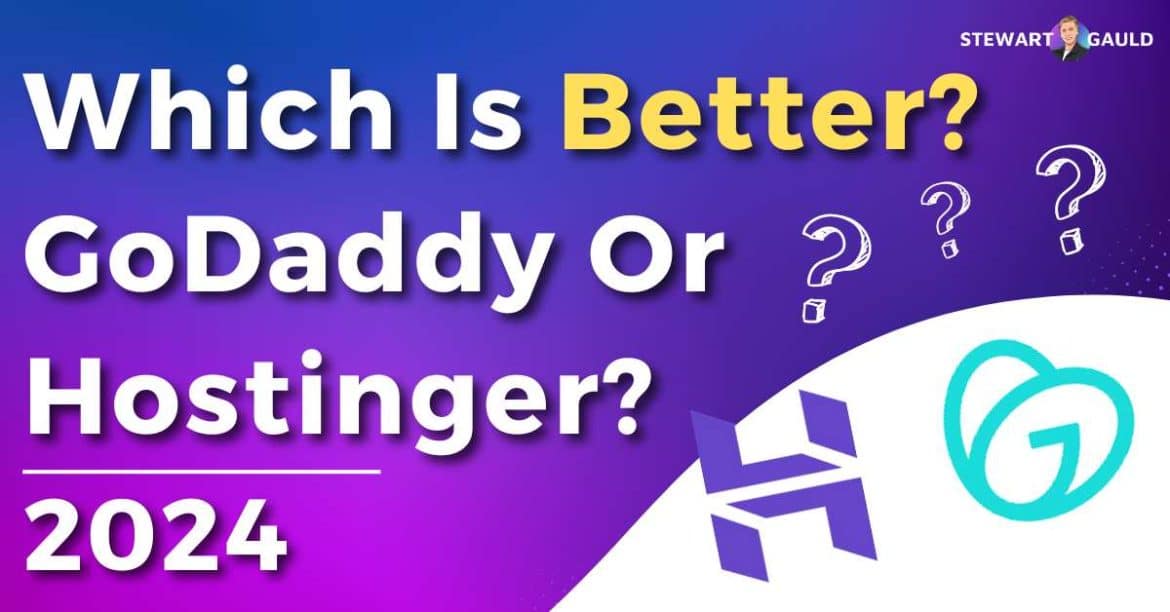Are you on the hunt for a web hosting provider and wondering which is better, GoDaddy or Hostinger?
GoDaddy and Hostinger are two of the most popular web hosting services on the market today, used by millions around the world.
Each comes with its own individual set of features, costs, and benefits.
So, the question arises….which is better? GoDaddy or Hostinger?
Read more: Top 8 Cheap Web Hosting Providers.
Quick Summary
- GoDaddy and Hostinger are two well-known web hosting, domain registration, and website builder platforms.
- GoDaddy’s plans include shared, VPS, and dedicated hosting, and Hostinger offers shared, cloud, and VPS hosting plans.
- Hostinger is easier to use, cheaper, and more reliable. However, GoDaddy has better customer service and may be better for high-traffic websites.
Which Is Better? GoDaddy or Hostinger?

Both GoDaddy and Hostinger are excellent web hosting and domain registration platforms.
With a strong reputation and competitive (sometimes annoying) online ads, some might think GoDaddy is the better option.
And don’t get me wrong, it is an impressive domain registration and web hosting service that many users choose to use over others.
However, Hostinger is cheaper and more reliable and offers an intuitive control panel that caters to beginners.
So, why is Hostinger better than GoDaddy? Let’s find out.
Read more: 5 Best Hostinger Alternatives For Small Business.
What Is GoDaddy?
GoDaddy is a popular domain registration, web hosting, and web design service platform.
With over 84 million registered domains, GoDaddy is now the biggest domain registrar in the world!
The platform is designed to cater to the diverse needs of its users, providing tools and solutions that help businesses establish, manage, and scale their online presence.
What Is Hostinger?
Initially launched in 2004, Hostinger has become a major player in the web hosting game, offering a wide range of services worldwide.
Hostinger offers reliable and affordable web hosting management features, domain registration capabilities, business email service, plus its very own AI website builder.
The platform now serves millions of users worldwide from 150+ countries, helping individuals and organizations create and grow their online presence.
Read more: Why Is Web Hosting So Expensive?
GoDaddy vs Hostinger

GoDaddy and Hostinger are reliable solutions that many businesses around the globe choose for their web hosting management needs.
We’ll compare both platforms’ offerings, functionality, performance, cost, and more to help you choose the right hosting partner for your website.
So, with that said, which is better? GoDaddy or Hostinger?
Read more: Top 10 Disadvantages of Hostinger
Ease Of Use
Both platforms are suitable for new users. However, Hostinger gains the competitive edge due to its custom-built control panel.
On the other hand, GoDaddy sticks to the traditional, well-known cPanel.
Hostinger’s hPanel offers a clean, streamlined, and simple interface that’s easier for beginners to handle.
While cPanel is comprehensive, the learning curve is certainly steeper than Hostinger’s version.
If you’re a WordPress user, you’ll be pleased to know that both GoDaddy and Hostinger offer one-click, easy installation.
However, every Hostinger plan comes with GitHub pre-installed (a feature not available with GoDaddy).
Winner = Hostinger.
Read more: Hostinger AI Website Builder Review.
Web Hosting Plans
GoDaddy and Hostinger both offer a wide range of hosting plans, so the winner of this round really depends on which type you need.
Both offer a range of tiered shared, WordPress, and VPS web hosting plans.
However, Hostinger doesn’t have dedicated hosting like GoDaddy does, and GoDaddy doesn’t have cloud hosting plans like Hostinger.
Winner = Tie.
Read more: Hostinger vs Bluehost.
Pricing Plans
Hostinger and GoDaddy offer a range of shared hosting plans to suit different needs:
Hostinger’s three shared-tiered hosting plans are as follows:
- Single Shared Hosting: From $2.99 per month.
- Premium Shared Hosting: From $3.99 per month.
- Cloud Startup Hosting: From $7.99 per month.
GoDaddy provides four shared hosting plans:
- Basic: From $6.50 per month.
- Deluxe: From $8.50 per month.
- Ultimate: From $10.99 per month.
- Maximum: From $15.95 per month.
GoDaddy’s plans are more diverse, offering a broader variety of options. However, this can be overwhelming if you’re unsure which type of hosting you should use!
And while the premium plans are competitively priced, as you can see, they’re more expensive than Hostinger’s.
Both platforms offer introductory and renewal plan deals, but Hostinger’s offers more substantial long-term savings, with discounts of up to 90% for multi-year commitments.
Therefore, Hostinger is a more budget-friendly option, especially for those willing to commit over time!
Winner = Hostinger.
Read more: Namecheap vs Hostinger.
GoDaddy vs Hostinger Features

For the purpose of this GoDaddy or Hostinger article, we’ll be looking at the features offered in both platform’s shared hosting plans only.
GoDaddy key features include:
- Extensive storage options.
- Automatic daily backups.
- Free domain and email with every plan.
- Unrestricted bandwidth across all plans.
- Free SSL certificates for all websites.
- A complimentary year of Office 365 email service.
- Support for numerous databases.
- Straightforward WordPress setup.
Hostinger shared hosting plan features include:
- The ability to host an unlimited number of websites.
- Email account.
- LiteSpeed servers for enhanced caching.
- A complimentary SSL certificate (with all plans).
- WordPress and GitHub integrations.
- Cloudflare-protected servers for added security.
- Comprehensive DNS management tools.
- A dedicated access manager for user permissions.
- Support for multiple MySQL databases.
- Free domain registration and backups (for some plans).
Overall, Hostinger offers a broader range of features, but GoDaddy compensates with a unique set of free integrations and benefits.
Therefore, I’ll leave this one up to you!
Winner = Tie.
Read more: SiteGround vs Hostinger.
GoDaddy vs Hostinger Performance

Hostinger uses LiteSpeed, a quicker, more stable web server than Apache (which is what GoDaddy uses).
Plus, Hostinger’s server infrastructure spans multiple global locations and is powered by a built-in caching solution and cutting-edge technology for swift website loading speeds.
Hostinger also guarantees a 99.9% uptime guarantee, which is regularly maintained, according to Medium.com.
Their server response time is also impressive, averaging 143 milliseconds worldwide.
With its significant number of data centers around the globe, GoDaddy also promises a 99.9% uptime guarantee.
However, their performance can fluctuate, particularly under heavy traffic conditions, with some customers experiencing delays.
GoDaddy’s server response time is slightly slower than Hostinger’s, around 171 milliseconds globally.
Winner = Hostinger.
GoDaddy vs Hostinger Customer Support

Hostinger provides around-the-clock customer assistance through live chat and email communications.
Unfortunately, Hostinger falls short regarding phone support, with no plans offering this as an option.
The good news is that Hostinger offers how-to guides, a robust knowledge base, and an informative blog for all users.
GoDaddy’s customer service framework is more comprehensive, delivering 24/7 assistance through online chat, email, and phone.
Additionally, they have a community forum, video tutorials, and a regularly updated blog.
Winner = GoDaddy.
Is Hostinger or GoDaddy Better For You?
GoDaddy certainly has a strong reputation and broad user base.
After comparing the ease of use, features, pricing, performance, and customer support of both web hosting platforms, it’s clear that Hostinger is the superior hosting choice.
Despite GoDaddy’s prominence in the hosting industry, Hostinger distinguishes itself by delivering affordable and highly reliable hosting services.
I recommend Hostinger for all small businesses due to its cost-effectiveness, rapid loading speeds, strong uptime, and cutting-edge technology.
Read more: Top 5 Disadvantages of Hostinger
Stews Final Thoughts
Okay, so which is better, GoDaddy or Hostinger?
It’s clear from my comparison that I prefer Hostinger over GoDaddy. But that doesn’t mean you will, too!
I suggest looking at your hosting needs, budget, and personal preferences before diving into either tool.
Only then will you be able to determine the best choice for you.
Thanks so much for reading! Do you agree with me? Or does GoDaddy have the cutting edge?

